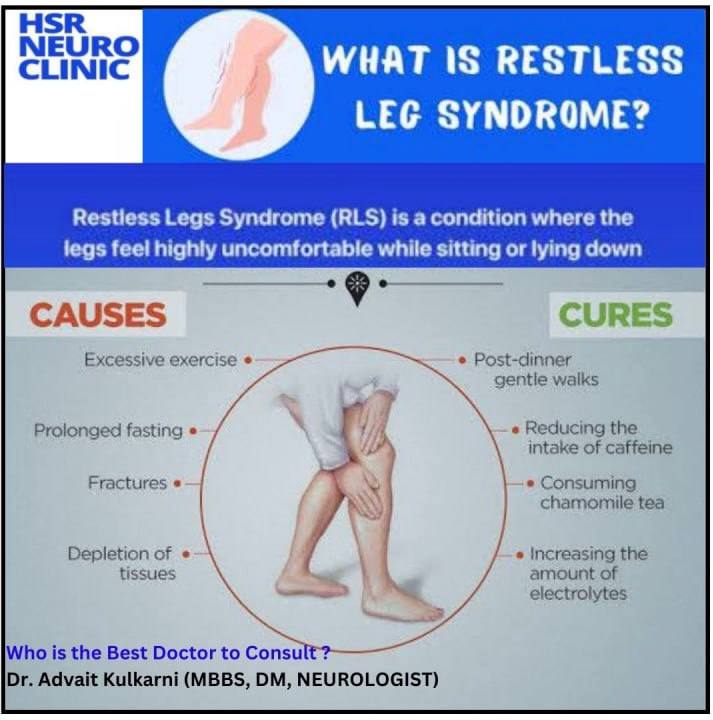+918048034088

This is your website preview.
Currently it only shows your basic business info. Start adding relevant business details such as description, images and products or services to gain your customers attention by using Boost 360 android app / iOS App / web portal.
Restless Leg Syndrome (RLS), also known as Willis-...

Restless Leg Syndrome (RLS), also known as Willis-Ekbom disease, is a neurological disorder that causes an uncontrollable urge to move the legs, usually due to uncomfortable sensations. These sensations often occur during periods of rest or inactivity, especially at night, leading to disrupted sleep and reduced quality of life. 🔴 Causes of RLS: The exact cause of RLS is unknown, but it is believed to be linked to: 🔴 Dopamine Imbalance: Dopamine is a brain chemical that controls movement. Its dysfunction may contribute to RLS. 🔴 Iron Deficiency: Low iron levels in the brain can affect dopamine activity. 🔴 Genetics: RLS tends to run in families, especially early-onset cases. 🔴 Chronic Conditions: Conditions like diabetes, kidney disease, Parkinson’s disease, and peripheral neuropathy can increase the risk. 🔴 Pregnancy: Some women experience RLS during pregnancy, especially in the third trimester, due to hormonal changes. 🔴 Medications: Certain drugs (antidepressants, antihistamines, antipsychotics) can worsen symptoms. 🧪Symptoms of RLS Uncomfortable sensations in the legs (burning, tingling, itching, crawling, pulling). Strong urge to move the legs, often relieved by movement. Symptoms worsen at rest, especially in the evening or at night. Sleep disturbances due to frequent leg movements. ✅ Diagnosis of RLS: There is no specific test for RLS, but diagnosis is based on: 🩻 Clinical history: Symptoms should meet the diagnostic criteria for RLS. 🩸Iron level test: Low serum ferritin levels may indicate iron deficiency. ⚡️Neurological examination: To rule out other conditions like neuropathy. Sleep study (Polysomnography): May be needed in severe cases with suspected periodic limb movement disorder (PLMD). Management & Lifestyle Modifications Making lifestyle changes can significantly reduce RLS symptoms: ✅ Diet & Nutrition: Increase iron-rich foods (spinach, red meat, legumes, nuts). Avoid caffeine, alcohol, and nicotine, as they worsen symptoms. Stay hydrated to prevent muscle cramps. ✅ Exercise & Movement: Engage in moderate exercise like walking, stretching, or yoga. Avoid excessive high-intensity workouts, as they may aggravate symptoms. ✅ Sleep Hygiene: 🎯Maintain a regular sleep schedule. Keep the bedroom cool and comfortable. Avoid electronic screens before bedtime. ✅ Relaxation Techniques: Warm baths, massages, and meditation can relax muscles. Try deep breathing exercises before bedtime. Treatment Options: 1. Conventional Treatment: 💊Iron Supplements: If iron levels are low. 💊Dopaminergic Medications which help regulate dopamine levels. 💊Anti-Seizure Medications: used in severe cases. 💊Muscle Relaxants & Sleep Aids: Prescribed in extreme cases with sleep disruption. 👉 If you or a loved one notice symptoms like above , consult the Best Neurologist near you promptly. Early care can make a meaningful difference. The nearest Neurologist in HSR Layout, Bengaluru. 📍Dr. Advait Kulkarni (Neurologist, MBBS, DM) www.dradvaitkulkarni.com

